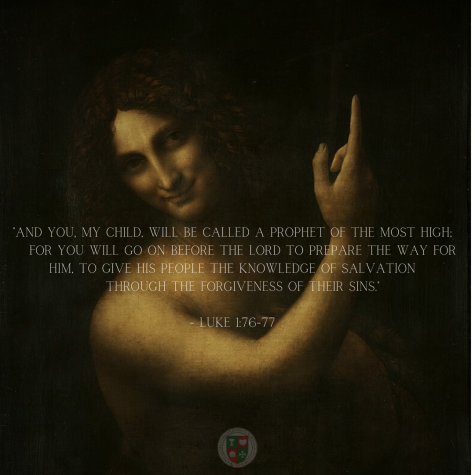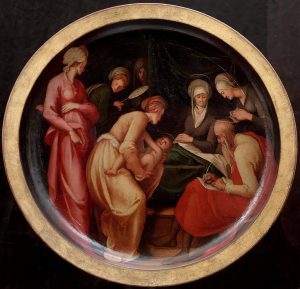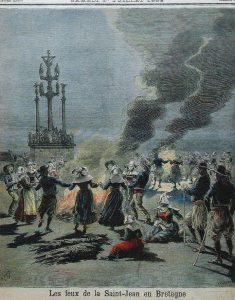The Nativity of Saint John The Baptist and its significance
June 23, 2023

“Truly I tell you, among those born of women there has not risen anyone greater than John the Baptist; yet whoever is least in the kingdom of heaven is greater than he.” (Mt 11:11).
The Catholic Church annually commemorates the birth of John the Baptist on June 24, recognizing his unique role as the precursor of Jesus. The solemnity held on this day honors John as an exemplary follower of Christ, and what it means to follow Him.
A solemnity is a feast which holds the highest significance in the Church, surpassing ordinary feast days. While other saints are remembered on the anniversaries of their deaths, St. John the Baptist, alongside the Virgin Mary, is celebrated with solemnities marking both his birth and his death. Why do John and Mary receive such distinguished honors? The Church commemorates Our Lady’s nativity as a recognition of her birth without sin, but what about John? Through the feast of his nativity, the Church suggests that John, too, was born sinless, although there is no definitive teaching on this matter.
According to Luke’s Gospel, Mary, who was pregnant with Jesus, visited her relative Elizabeth, who was six months pregnant with John. Upon Mary’s greeting, Elizabeth was “filled with the holy Spirit” (1:41) and her unborn “leaped for joy” (v. 44) in her womb. This event seems to fulfill the earlier prophecy given to John’s father by the angel Gabriel, proclaiming that the child would be “filled with the holy Spirit even from his mother’s womb.” (1:15). Consequently, the belief suggests that John was sanctified at that moment, cleansed from original sin as if he were “baptized” in his mother’s womb.
It is important to note that this implies John was freed from original sin in the womb and later born without sin, but it does not imply that he was conceived without sin. The Immaculate Conception is a privilege unique to Our Lady among the saints, as she was preserved from original sin from the very moment of her existence. On the date of his nativity, we honor John the Baptist, who was filled with the Holy Spirit while still in his mother’s womb. God chose him to herald His Son, and he lived a life of exemplary holiness, ultimately martyred for his faith. The Church commemorates his martyrdom with a memorial on August 29.

Nativity of Saint John the Baptist, Zechariah writing, “His name is John”. Pontormo, on a desco da parto, c. 1526.
The Nativity of John the Baptist is one of the oldest celebrations in the Christian Church, observed in both the Eastern (Greek) and Western (Latin) liturgies to honor this saint. It has been publicly celebrated as early as the 4th century. It was listed as one of the principal festivals by the Council of Agde in 506, and in that region, it was a day of rest celebrated with three Masses: a vigil, at dawn, and at midday.
What led the day of the celebration to be on June 24th? This date was eventually chosen for the solemnity due to the fact that Scripture tells us John was conceived six months before Jesus. Presumably, John was born about six months prior to Christ, whose nativity is celebrated on December 24. Another significant factor in selecting John’s birth date was the pagan tradition of celebrating the summer solstice in late June. Pagan cultures recognized this time as the beginning of shorter days and traditionally lit bonfires to mark the change of seasons.
The Church acknowledged the importance of incorporating this ancient and popular tradition among the its future converts, while ensuring it was not associated with pagan rituals. As the events in the life of Christ did not directly align with the midsummer festival, early Church leaders turned to the life of John the Baptist. Just as the birth of Christ was celebrated during the winter solstice in December, John the Baptist’s birth would be celebrated during the summer solstice. This choice was a perfect fit, as the nativity of John foreshadows the birth of Jesus. We are reminded of John’s words regarding Jesus and their parallel to the changing of seasons: “He must increase, but I must decrease” (John 3:30).
Today, the age-old tradition of lighting fires on the eve of St. John’s day can be observed in various parts of the world, particularly in Europe. These fires symbolize the acknowledgement of John and his proclamation of Jesus, who is referred to as “the light of the world.” Although the origins of these fires lie in a pagan ritual, most participants today honor St. John without any pagan connotations. In addition to bonfires, parades and festivals are often held, continuing until daybreak. In some countries, Christians splash water on one another or go swimming at midnight to remember their baptism in honor of St. John.

The Nativity of St. John being celebrated in Brittany, 1893.
In Canada, Saint-Jean-Baptiste Day (Fête de la Saint-Jean-Baptiste), also known as St. John the Baptist Day, is a holiday celebrated on June 24 in the province of Quebec. The tradition of celebrating Saint-Jean-Baptiste landed in Canada with the first French colonists. The earliest mention of these celebrations in North America dates back to 1606 when settlers landed on the coast of Newfoundland. It was officially declared a public holiday in Quebec in 1925, accompanied by publicly funded events organized throughout the province.
John the Baptist served as the herald of Christ, “a voice of one crying out in the desert, ‘Prepare the way of the Lord'” (Mt 3:3). John’s message to the people many years ago emphasized the imminent presence of the Lord and the need for preparedness. On the solemnity of the Nativity of St. John the Baptist, the Church renews this message, inviting all to embrace it wholeheartedly.
Categories
Discerning, a Vocations BlogGeneral News
Stirrings
Uncategorized
New Basilian Associates Begin Their Journey
From left to right: Diego Alejandro Martínez López, José de Jesús Rodríguez Pérez, CSB, José Yonni Villa de Jesús, José Juan Téllez Hernández We joyfully celebrated the Incorporation of three […]
Read MoreSt. Basil’s Parish Celebrates 169th Founding Anniversary
This past weekend we celebrated 169 years since St. Basil’s Parish first opened its doors in Toronto. Since then, countless generations have gathered here to pray, celebrate, and grow in […]
Read MoreSt. Thomas Begins Year with Holy Spirit Mass
As the University of St. Thomas begins a new academic year, the campus community gathered for the Mass of the Holy Spirit — a cherished tradition that invites God’s guidance, […]
Read MoreBasilians Begin New Ministry in Houma-Thibodaux
This week, our Superior General visited the Diocese of Houma-Thibodaux, where Basilians Fr. Osman de la Hoz and Fr. Jose Alberto Juarez are serving the growing Hispanic community with dedication […]
Read MoreFr. George Smith Blesses New Student Center
Fr. George Smith, CSB blessed the new center in the Lavery Library, marking a significant milestone in St. John Fisher University’s commitment to academic excellence and student support. The center […]
Read More